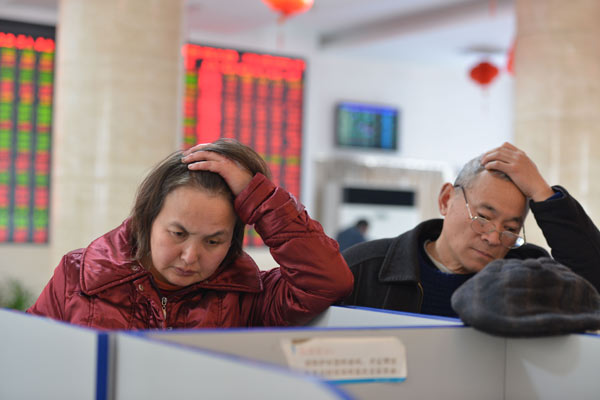New IPO regulations aim to allay concern of potential share investors
|
 |
|
Investors ponder transactions at a brokerage in Fuyang, Anhui province, on Thursday. The Shanghai Composite Index slid 0.3 percent to 2,109.38 points on Thursday. It dropped by almost 7 percent in 2013, making it Asia’s worst-performing benchmark equity index. Lu Qijian / For China Daily |
A clearer picture of companies about to go public is emerging with the regulator mandating more complete disclosure from the first group of Chinese enterprises to issue shares under new regulations.
Three of the first 11 companies to get IPO approvals — Guangdong Xinbao Electrical Appliances Holdings Co Ltd, Zhejiang Wolwo Bio-Pharmaceutical Co and Truking Technology Ltd — included earnings forecasts for the first quarter of 2014 in their prospectuses, in addition to full-year data for 2013.
Under IPO rules released by the China Securities Regulatory Commission in November, prospectuses must include updated financial data and supplemental information about developments that occur after companies submit financial reports to IPO reviewers.
The rules don't, however, specifically require forecasts for earnings and other figures.
"It seems some companies are trying their best to publish the most updated information to attract investors, which is in line with the direction of the CSRC's reforms," said Vivien Xu, an investment banker based in Guangzhou.
Xu said investment bankers are under "bigger pressure" since the CSRC issued the IPO rules.
"Conflicting information or changes to important data could lead to an application's rejection and the bankers on the deal being barred from filing new applications for a year," Xu said.
She noted that there is almost no room for falsehood under the new rules.
Underwriters and other intermediaries will also be held accountable if misleading statements or major omissions are found in the IPO process.
"The CSRC is putting more responsibility on intermediaries. A significant portion of the companies seeking an IPO will not be able to pass the vetting process of intermediaries. Meanwhile, underwriting fees will rise," said a Shanghai-based investment banker.
Major shareholders must also disclose their intentions to reduce their stakes in the future and the terms they seek in IPO prospectuses.
Xu said that this provision of the IPO rules is meant to ease investor concerns about such post-IPO sales suddenly draining capital from the market.
Stakes held by controlling shareholders and senior managers of listed companies in China have in the past been locked up for anywhere from six months to five years after initial offerings.
Under the CSRC's new rules, any sale of such shares within two years after the lock-up periods expire may not be at a price lower than the IPO price.
Xinbao Electrical Appliances and Truking Technology (which makes pharmaceutical equipment) both said in their prospectuses that their biggest shareholders would extend the lock-up period of their shares by two years.
That means those shares won't be traded in the first five years after listing.
The benchmark Shanghai Composite Index slid by almost 7 percent in 2013, making it Asia's worst-performing benchmark equity index.
The Shanghai Stock Exchange's resolutions for 2014 include strengthening protection for small investors and "safeguarding justice" on the market.
The SSE said it will diversify its products to satisfy investor demand, improve the structure and quality of listed companies and push for better information disclosure.
"We can't predict the market trend in 2014, but we believe stronger protection of investors will help improve the users' experience and attract more investors," a senior official of the exchange said, according to the China Securities Journal.
SSE Chairman Gui Minjie said previously that the exchange will pursue broad reform of the entire transaction process, including offers, listings, refunds and delisting. Information disclosure must be more efficient if the SSE's blue-chip market is to be a key platform for capital and resource allocation.
Shares fell on Thursday in the first day of 2014, as investors fretted about slower economic growth after official and private manufacturing surveys showed weaker factory activity in the last quarter of 2013.
The CSI300, which covers the leading Shanghai and Shenzhen A-share listings, fell 0.4 percent, while the Shanghai Composite Index slid 0.3 percent to 2,109.38 points.
Figures released on Wednesday showed the official Purchasing Managers' Index slid to a four-month low in December, while a private report Thursday also signaled that manufacturing grew at a slower pace.
"The weaker PMI probably heralds a weak start of economic growth this year as China is still finding a new growth model," said Wang Zheng, the Shanghai-based chief investment officer at Jingxi Investment Management Co.
"The weaker economy will hold back stocks."
Bloomberg contributed to this story.
|
|
|
|
|
|
|
|
